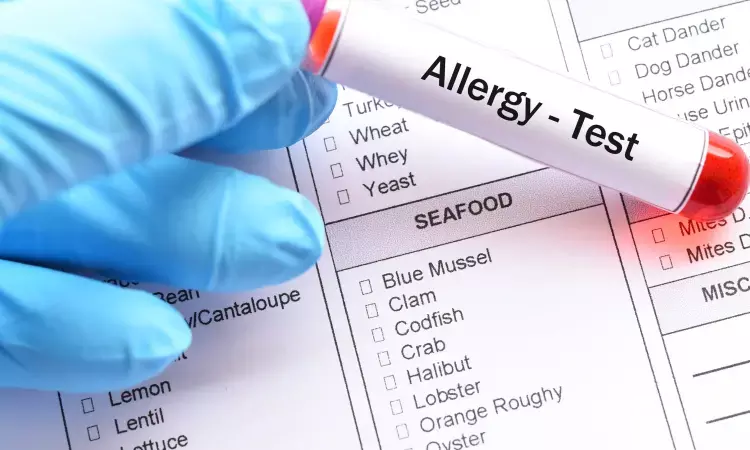- Home
- Medical news & Guidelines
- Anesthesiology
- Cardiology and CTVS
- Critical Care
- Dentistry
- Dermatology
- Diabetes and Endocrinology
- ENT
- Gastroenterology
- Medicine
- Nephrology
- Neurology
- Obstretics-Gynaecology
- Oncology
- Ophthalmology
- Orthopaedics
- Pediatrics-Neonatology
- Psychiatry
- Pulmonology
- Radiology
- Surgery
- Urology
- Laboratory Medicine
- Diet
- Nursing
- Paramedical
- Physiotherapy
- Health news
- Fact Check
- Bone Health Fact Check
- Brain Health Fact Check
- Cancer Related Fact Check
- Child Care Fact Check
- Dental and oral health fact check
- Diabetes and metabolic health fact check
- Diet and Nutrition Fact Check
- Eye and ENT Care Fact Check
- Fitness fact check
- Gut health fact check
- Heart health fact check
- Kidney health fact check
- Medical education fact check
- Men's health fact check
- Respiratory fact check
- Skin and hair care fact check
- Vaccine and Immunization fact check
- Women's health fact check
- AYUSH
- State News
- Andaman and Nicobar Islands
- Andhra Pradesh
- Arunachal Pradesh
- Assam
- Bihar
- Chandigarh
- Chattisgarh
- Dadra and Nagar Haveli
- Daman and Diu
- Delhi
- Goa
- Gujarat
- Haryana
- Himachal Pradesh
- Jammu & Kashmir
- Jharkhand
- Karnataka
- Kerala
- Ladakh
- Lakshadweep
- Madhya Pradesh
- Maharashtra
- Manipur
- Meghalaya
- Mizoram
- Nagaland
- Odisha
- Puducherry
- Punjab
- Rajasthan
- Sikkim
- Tamil Nadu
- Telangana
- Tripura
- Uttar Pradesh
- Uttrakhand
- West Bengal
- Medical Education
- Industry
Infants exposed to maternal acid suppressants and antibiotics at higher risk of food allergy

A study was presented at the American Academy of Allergy, Asthma & Immunology Annual Meeting, according to which the Maternal use of antibiotics and acid suppressants during pregnancy increases the risk for infant food allergy. The findings of this study focus on the need for preventive strategies in future.
There is a lack of data on the association between maternal acid suppressant medication and antibiotic use for food allergy in infants. Researchers studied this association by analyzing data of MARC-5 of infants who had a history of hospitalization with bronchiolitis with a median age was three months at enrolment. The information on maternal ASM use of proton pump inhibitors or H2 receptor antagonists was obtained from parent reports.
Based on the algorithm, children were categorized as likely, possible or unlikely food allergies to milk, egg, peanut, and tree nut at 12 months. This algorithm utilized parent reports, chart reviews, and serum-specific IgE and skin testing.
The study results could be summarised as follows:
- A total of 921 infants were followed longitudinally.
- One hundred forty-four infants constituting 16%, had a history of maternal ASM exposure.
- Four hundred fourteen infants constituting 46%, had antibiotic exposure.
- At the age of 1 year, nearly 1.4 % (13 infants), 2.1 % (19 infants) and 82 % (754 infants) had likely food allergy, possible food allergy and unlikely food allergy.
- Following adjustments, the odds of FA (possible and likely) were higher with maternal ASM exposure and maternal antibiotic exposure, with an adjusted odds ratio of 2.33 and 3.54, respectively, than with children without exposure.
The researchers found higher odds of food allergy development at such an early age in infants tied to Maternal ASM and antibiotic exposure. It is essential for physicians to discuss the risk and benefits of maternal medication use with pregnant women.
Further investigations are warranted on the relationship between maternal medications and FA risk during later childhood.
BDS, MDS in Periodontics and Implantology
Dr. Aditi Yadav is a BDS, MDS in Periodontics and Implantology. She has a clinical experience of 5 years as a laser dental surgeon. She also has a Diploma in clinical research and pharmacovigilance and is a Certified data scientist. She is currently working as a content developer in e-health services. Dr. Yadav has a keen interest in Medical Journalism and is actively involved in Medical Research writing.
Dr Kamal Kant Kohli-MBBS, DTCD- a chest specialist with more than 30 years of practice and a flair for writing clinical articles, Dr Kamal Kant Kohli joined Medical Dialogues as a Chief Editor of Medical News. Besides writing articles, as an editor, he proofreads and verifies all the medical content published on Medical Dialogues including those coming from journals, studies,medical conferences,guidelines etc. Email: drkohli@medicaldialogues.in. Contact no. 011-43720751


